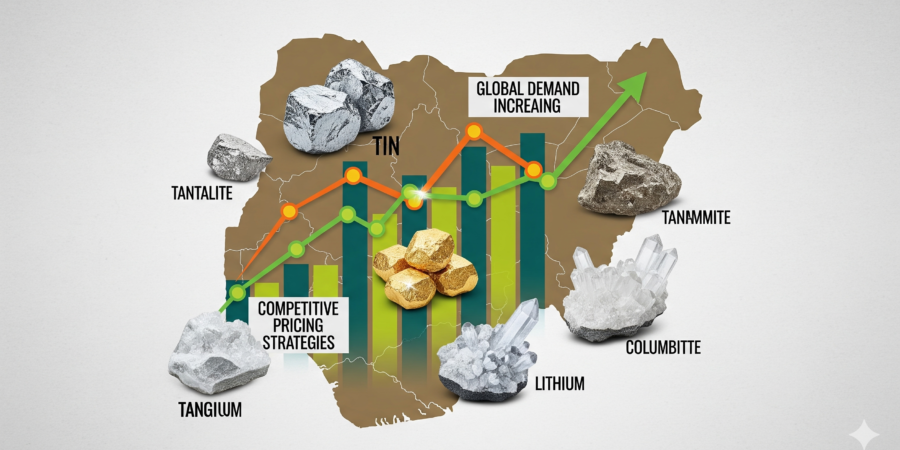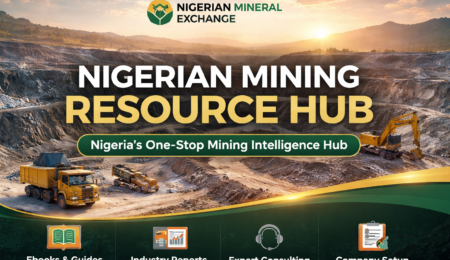Nigeria’s mineral sector is no longer a hidden story. With global shifts in energy, technology, and industrial production, demand for Nigeria’s minerals has surged, creating unprecedented opportunities for investors. From gold and gemstones to lithium and industrial minerals, the Nigerian mineral market is quickly becoming a cornerstone of Africa’s resource-driven growth.
But how does the Nigerian mineral market actually work? What drives demand? How are minerals priced? And what is the growth potential in 2025 and beyond?
This article breaks it down for investors, traders, and businesses seeking clarity on Nigeria’s mineral landscape.
Nigeria’s Mineral Wealth at a Glance
Nigeria is endowed with over 44 commercially viable minerals, spread across all 36 states. Some of the most significant include:
- Precious Metals: Gold, silver, platinum.
- Gemstones: Sapphire, tourmaline, emerald, aquamarine.
- Battery & Tech Minerals: Lithium, rare earths, columbite, tantalite.
- Base & Industrial Minerals: Lead, zinc, limestone, coal, barite, gypsum.
Despite this vast potential, less than 10% of reserves have been explored with modern techniques. This makes Nigeria one of the world’s last great untapped mining frontiers.
Demand Dynamics in the Nigerian Mineral Market
1. Global Demand for Critical Minerals
Lithium and rare earth elements are in unprecedented demand due to their role in electric vehicles (EVs), renewable energy, and advanced technology. Nigeria is positioning itself as a new supply source in this global race.
2. Booming Jewelry and Luxury Markets
Gemstones from Nigeria, particularly sapphires and tourmalines, are highly sought after in Asian and European luxury markets, driving up export demand.
3. Construction & Infrastructure Growth
Domestically, industrial minerals like limestone, gypsum, and granite fuel Nigeria’s massive construction sector, one of the largest in Africa.
4. Energy Transition
Coal and industrial minerals are in demand for power generation and manufacturing, though the government is also driving investments into cleaner energy sources.
Pricing Trends in the Nigerian Mineral Market
Pricing in the Nigerian mineral market is influenced by several factors:
- Global Commodity Prices: Gold, lithium, and rare earths follow global price benchmarks.
- Quality & Grade: Higher-grade ores fetch premium prices in international markets.
- Export Regulations & Logistics: Export duties, licensing, and shipping costs directly affect pricing margins.
- Local Market Dynamics: For construction and industrial minerals, domestic demand and regional supply determine prices.
Example:
- Gold prices track the London Bullion Market, with Nigerian sellers offering discounts of 5–15% to attract buyers.
- Lithium concentrates from Nigeria are priced competitively against other African sources like Zimbabwe.
- Gemstone pricing depends on cut, clarity, and certification. Nigerian gems often fetch high values once certified abroad.
Growth Potential in 2025 and Beyond
Nigeria’s mineral market is on a steep growth trajectory due to:
- Policy Reforms – Streamlined licensing, incentives, and export policies designed to attract foreign investment.
- Infrastructure Development – Railways, roads, and port upgrades will reduce logistics costs.
- Increased Exploration – New surveys and international partnerships will reveal more commercially viable deposits.
- Value Addition Drive – Government policies encourage local processing, increasing returns for investors.
Industry analysts project double-digit annual growth in Nigeria’s mining GDP contribution from 2025 onward, with minerals like lithium and gold leading the way.
How Investors Can Position Themselves
- Identify High-Demand Minerals
Focus on minerals with global demand surges -like lithium, rare earths, and gold, rather than oversaturated commodities. - Leverage Local Partnerships
Partner with experienced Nigerian firms that understand licensing, community relations, and regulatory frameworks. - Secure Legal Compliance
Work only with licensed operators to avoid losses from fraudulent or illegal operations. - Adopt a Long-Term Strategy
Rather than chasing short-term arbitrage, investors should focus on structured projects with room for scalability.
How We Help Investors
At the Nigerian Mineral Exchange, we simplify access to Nigeria’s mineral market by offering trusted consultancy and practical investment solutions:
1. The Nigerian Mining Investment Navigator
Your personalized guide to vetted opportunities in Nigeria’s mineral sector, covering demand, pricing, and ROI forecasts.
👉 Book your consultation today
2. Mining & Mineral Trading Company Setup (Nigeria)
We help foreign and local investors set up licensed mining & trading companies in Nigeria, ensuring compliance and long-term sustainability.
👉 Learn more about setting up your company
3. Ebook: Unlocking Nigeria’s Mineral Wealth – 113 Lucrative Business Ideas
Discover specific mineral-related businesses with high-growth potential. This resource is designed to spark ideas and provide a roadmap for action.
Final Word
The Nigerian mineral market is entering a golden age of growth. Rising global demand, attractive pricing, and government-backed reforms create fertile ground for profitable investments.
But success depends on making informed decisions, securing legal compliance, and working with trusted local partners. By positioning yourself now, you can benefit from Nigeria’s transformation into a global mining hub.
The time to act is now, before the market becomes saturated.
📘 The Nigeria Mineral Trading & Licensing Blueprint (2026 Edition)
If you are serious about buying, selling, or trading minerals legally in Nigeria, you cannot afford to rely on guesswork, outdated advice, or hearsay. The regulatory environment is tightening fast, and costly mistakes now lead to permit denials, seizures, or permanent blacklisting.
That’s why we created The Nigeria Mineral Trading & Licensing Blueprint: 2026 Guide to Buying Center Licenses & Purchase Permits — an updated, clear, step-by-step, insider guide that shows you exactly how to obtain Mineral Buying Center Certificates, Purchase & Possession Permits, and related approvals without delays or regulatory traps.
This guide distills real regulatory procedures for 2026, compliance requirements, and practical insights used by serious operators — saving you months of confusion, wasted money, and avoidable risk.
If mineral trading is part of your business future, this blueprint is not optional — it’s protection.
READ ALSO:





Leave a Reply